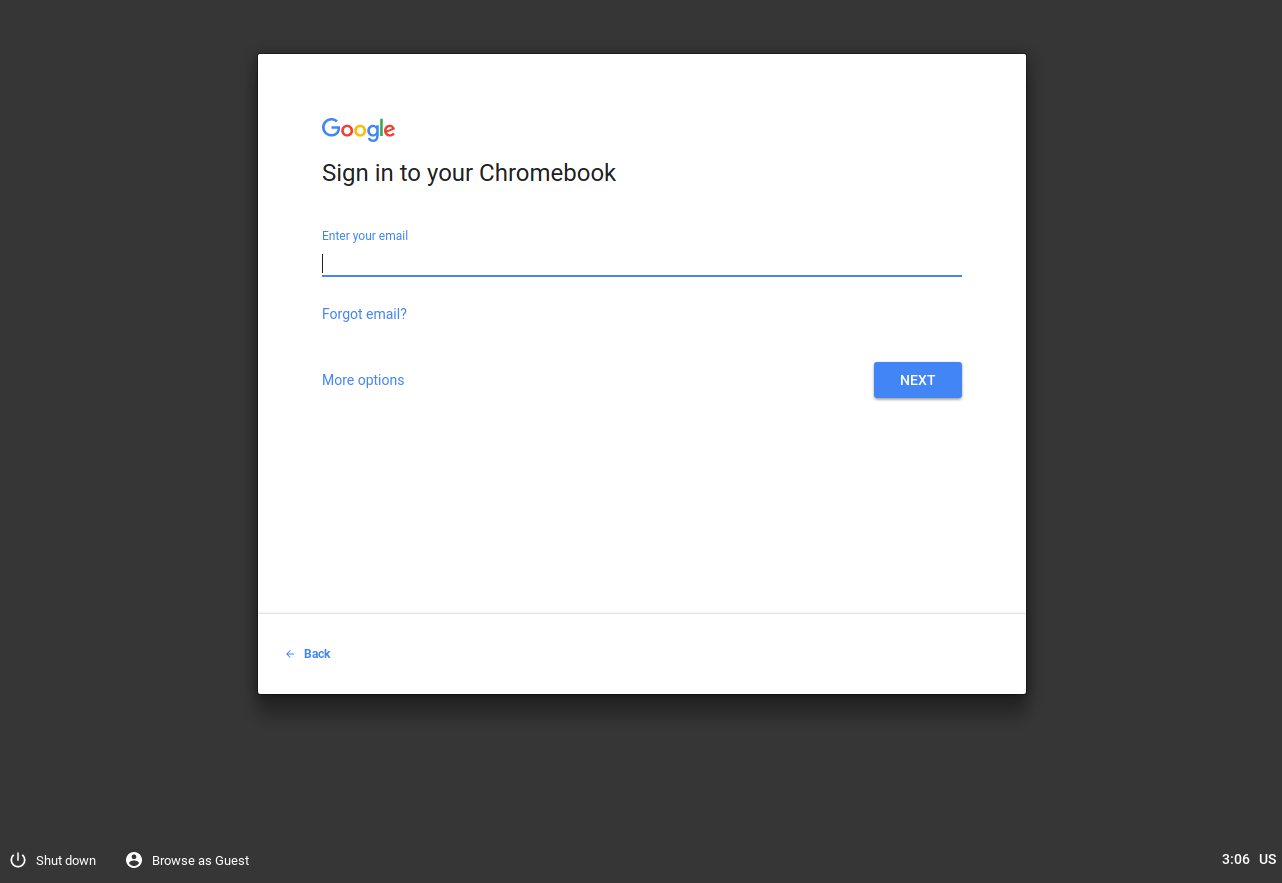Building ChromiumOS for Qemu
Published
Getting ChromiumOS building is reasonably easy, but running it under Qemu requires some work.

So let's start off by covering how ChromiumOS relates to ChromeOS. The ChromiumOS project is essentially ChromeOS minus branding and some packages for things like the media digital restrictions management.
But on the whole, almost everything is there, and the pieces that aren't, you don't need.
ChromiumOS
Depot tools
In order to check out ChromiumOS and other large Google projects, you'll need depot tools.
git clone https://chromium.googlesource.com/chromium/tools/depot_tools.git
export PATH=$PATH:$(PWD)/depot_tools
Maybe you'd want to add the PATH export to your .bashrc.
Building ChromiumOS
mkdir chromiumos
cd chromiumos
repo init -u https://chromium.googlesource.com/chromiumos/manifest.git --repo-url https://chromium.googlesource.com/external/repo.git [-g minilayout]
repo sync -j75
cros_sdk
export BOARD=amd64-generic
./setup_board --board=${BOARD}
./build_packages --board=${BOARD}
./build_image --board=${BOARD} --boot_args "earlyprintk=serial,keep console=tty0" --noenable_rootfs_verification test
./image_to_vm.sh --board=${BOARD} --test_image
How to (not) boot ChromiumOS
So, this is a command baked into ChromiumOS using the cros_start_vm command,
but at least on my machine it does not seem to boot properly.
I have as of yet not been able to get any graphical output (over VNC).
cros_sdk
./bin/cros_start_vm --image_path=../build/images/${BOARD}/latest/chromiumos_qemu_image.bin --board=${BOARD}
Running Qemu ourselves
So if the intended tools don't work, we'll just have to roll up our sleeves and do it ourselves. This is how I got ChromiumOS booting.
Install build dependencies
These dependencies were available on Ubuntu 17.10, some alternative packages might be needed for your distributions.
sudo apt install autoconf libaio-dev libbluetooth-dev libbrlapi-dev libbz2-dev libcap-dev libcap-ng-dev libcurl4-gnutls-dev libepoxy-dev libfdt-dev libgbm-dev libgles2-mesa-dev libglib2.0-dev libgtk-3-dev libibverbs-dev libjpeg8-dev liblzo2-dev libncurses5-dev libnuma-dev librbd-dev librdmacm-dev libsasl2-dev libsdl1.2-dev libsdl2-dev libseccomp-dev libsnappy-dev libssh2-1-dev libspice-server-dev libspice-server1 libtool libusb-1.0-0 libusb-1.0-0-dev libvde-dev libvdeplug-dev libvte-dev libxen-dev valgrind xfslibs-dev xutils-dev zlib1g-dev libusbredirhost-dev usbredirserver
Virglrenderer
Virglrenderer creates a virtual 3D GPU, that allows the Qemu guest to use the graphics capabilities of the host machine.
This step is optional, but allows for hardware accelerated OpenGL support on the guest system. If you don't want to use Virgl, remove it from the Qemu configure step and the Qemu runtime flags.
git clone git://git.freedesktop.org/git/virglrenderer
cd virglrenderer
./autogen.sh
make -j7
sudo make install
Qemu
Qemu is a full system emulator, and supports a multitude of machine architectures. We're going to to use x86_64.
git clone git://git.qemu-project.org/qemu.git
mkdir -p qemu/build
cd qemu/build
../configure --target-list=x86_64-softmmu --enable-gtk --with-gtkabi=3.0 --enable-kvm --enable-spice --enable-usb-redir --enable-libusb --enable-virglrenderer --enable-opengl
make -j7
sudo make install
Run image
Now you can boot the image using Qemu.
Note that running Qemu with the virtio options requires that your host machine
is running a Linux kernel which was built with the kconfig options CONFIG_DRM_VIRTIO,
CONFIG_VIRT_DRIVERS and CONFIG_VIRTIO_XXXX.
cd chromiumos
/usr/local/bin/qemu-system-x86_64 \
-enable-kvm \
-m 2G \
-smp 4 \
-hda src/build/images/amd64-generic/latest/chromiumos_qemu_image.bin \
-vga virtio \
-net nic,model=virtio \
-net user,hostfwd=tcp:127.0.0.1:9222-:22 \
-usb -usbdevice keyboard \
-usbdevice mouse \
-device virtio-gpu-pci,virgl \
-display gtk,gl=on
Conclusion
Hopefully this guide will have helped you to build all of the software needed to boot your very own ChromiumOS.
This post has been a part of work undertaken by my employer Collabora.